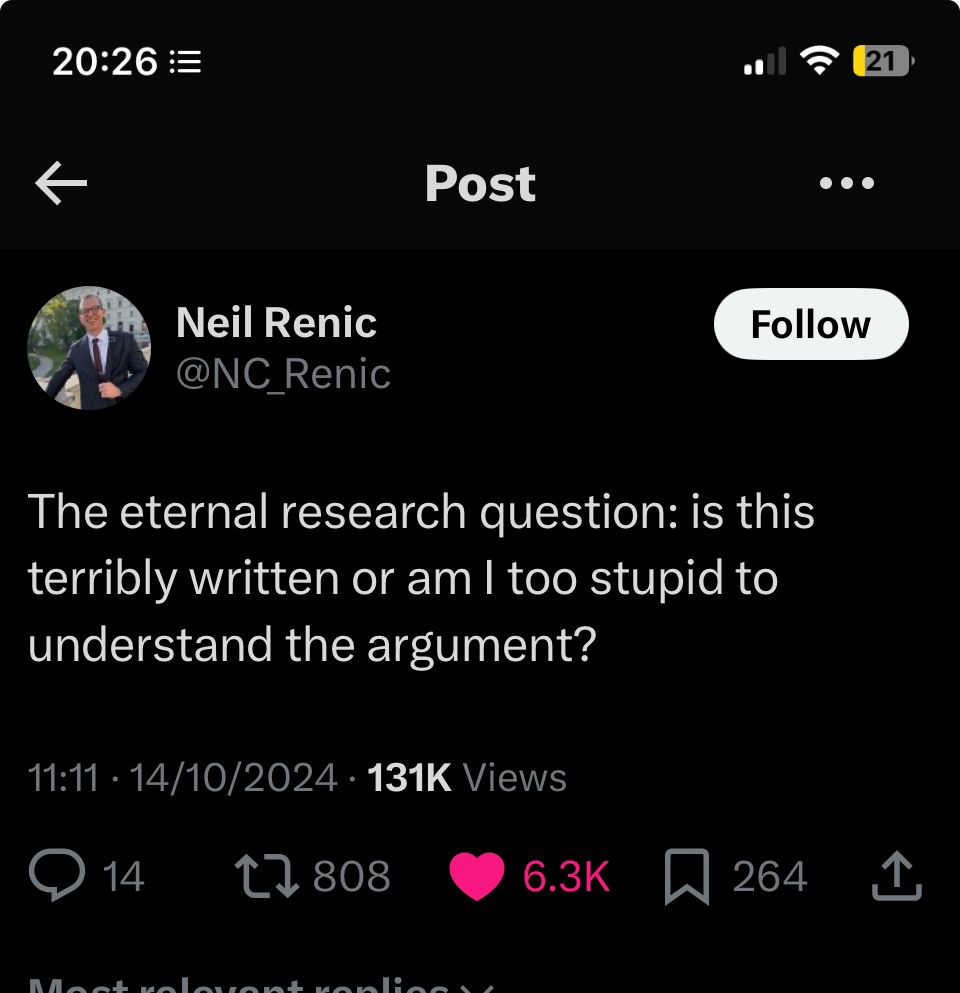this post was submitted on 16 Oct 2024
1037 points (99.3% liked)
Science Memes
11189 readers
3036 users here now
Welcome to c/science_memes @ Mander.xyz!
A place for majestic STEMLORD peacocking, as well as memes about the realities of working in a lab.

Rules
- Don't throw mud. Behave like an intellectual and remember the human.
- Keep it rooted (on topic).
- No spam.
- Infographics welcome, get schooled.
This is a science community. We use the Dawkins definition of meme.
Research Committee
Other Mander Communities
Science and Research
Biology and Life Sciences
- !abiogenesis@mander.xyz
- !animal-behavior@mander.xyz
- !anthropology@mander.xyz
- !arachnology@mander.xyz
- !balconygardening@slrpnk.net
- !biodiversity@mander.xyz
- !biology@mander.xyz
- !biophysics@mander.xyz
- !botany@mander.xyz
- !ecology@mander.xyz
- !entomology@mander.xyz
- !fermentation@mander.xyz
- !herpetology@mander.xyz
- !houseplants@mander.xyz
- !medicine@mander.xyz
- !microscopy@mander.xyz
- !mycology@mander.xyz
- !nudibranchs@mander.xyz
- !nutrition@mander.xyz
- !palaeoecology@mander.xyz
- !palaeontology@mander.xyz
- !photosynthesis@mander.xyz
- !plantid@mander.xyz
- !plants@mander.xyz
- !reptiles and amphibians@mander.xyz
Physical Sciences
- !astronomy@mander.xyz
- !chemistry@mander.xyz
- !earthscience@mander.xyz
- !geography@mander.xyz
- !geospatial@mander.xyz
- !nuclear@mander.xyz
- !physics@mander.xyz
- !quantum-computing@mander.xyz
- !spectroscopy@mander.xyz
Humanities and Social Sciences
Practical and Applied Sciences
- !exercise-and sports-science@mander.xyz
- !gardening@mander.xyz
- !self sufficiency@mander.xyz
- !soilscience@slrpnk.net
- !terrariums@mander.xyz
- !timelapse@mander.xyz
Memes
Miscellaneous
founded 2 years ago
MODERATORS
you are viewing a single comment's thread
view the rest of the comments
view the rest of the comments

That same problem can be seen in law and it's a lot more relevant to the average citizen than academic papers, since "know your rights" means jack shit if you have no fucking clue what the words mean.
It's snobbish gatekeeping to feel superior to the filthy plebs
goodness, don't even get me started on law. I had a hard time reading my tenancy agreement, and I know I'm not a stupid person. I'm not saying this to brag, but how is someone, let's say less intellectually inclined, supposed to deal with that? Sign whatever paper they get told allows them to have shelter and hope they didn't just sell their firstborn to the landlord?
The law falls back to a bunch of hidden rules if the language isn't explicit.
"No vehicles in the park" is a simple rule, but then poses problems when you have to ask whether that includes baby strollers, regular bicycles, or electric assist bicycles, whether there's an exception for ambulances in an emergency, etc.
Somewhat famously, there was a case a decade or so ago where someone was prosecuted under Sarbanes Oxley's obstruction of justice provisions, passed to criminalize Enron-like accounting coverups. The guy was convicted for tossing undersized fish overboard to avoid prosecution for violating fish and wildlife rules. The statute made it a crime for anyone who “knowingly alters, destroys, mutilates, conceals, covers up, falsifies, or makes a false entry in any record, document, or tangible object with the intent to impede, obstruct, or influence” a federal investigation. So the Supreme Court had to figure out whether a fish is a "tangible object" in the meaning of the law, when it is clearly a "tangible object" within the normal meaning of the term, but not the type of object that stores records, as everything else described in the criminal statute.
So that just means, in the end, simplicity of language can betray complexity of meaning underneath. Lawyers tend to prefer to make things clear up front so that there's no uncertainty later on, and that just leads to unreasonably complicated language.